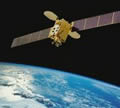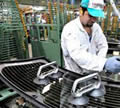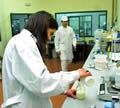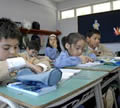- Reunión inter-regional de expertos sobre la medición de la cooperación Sur-Sur
- La SEGIB lanza newsletter con nuevas historias sobre cooperación sur-sur y triangular
- ¿Cuál es el valor de las universidades públicas hoy en Argentina?
- Una cumbre empresarial entre Corea del Sur y América Latina tendrá lugar esta semana
- Cuba en la Cooperación Sur-Sur: el camino para la integración
- Good Practices in South-South and Triangular Cooperation for Sustainable Development – Volume 4
- Global South-South Development Expo 2022 Concept Note
- Cooperación Sur-Sur en América Latina en tiempos de pandemia
- Valoración de la cooperación Sur-Sur en seis países seleccionados de América Latina y el Caribe: desafíos compartidos en la implementación de la Agenda 2030 para el Desarrollo Sostenible
- Desarrollo en transición: propuesta de concepto y medición para una cooperación renovada en América Latina y el Caribe
In the past, South-South cooperation consisted primarily of sharing technologies, approaches and lessons in technical areas, including the improvement of livestock breeds, health, food processing and efficient water use.
Taken from UN-IFAD Website
United Nations, September 12, 2014.- Every year on this date, the United Nations commemorates the adoption in 1978 of the #Buenos Aires Plan of Action for Promoting and Implementing Technical Cooperation among Developing Countries".
UN agencies, including IFAD, recognize that countries at similar levels of development are particularly well placed to help each other. The same holds true for countries that are at different levels but have a common interest in sharing knowledge and experiences to address common development challenges. South-South Cooperation is also an important complement to North-South cooperation.
In the past, South-South cooperation consisted primarily of sharing technologies, approaches and lessons in technical areas, including the improvement of livestock breeds, health, food processing and efficient water use. Today, it also involves continuous dialogue on regional policy coordination and other government actions, and sharing knowledge, skills, expertise and resources. Recent developments in South-South and Triangular Cooperation (SSTC) have resulted in increased volume of South-South trade, South-South flows of foreign direct investment, movements towards regional integration, technology transfers, sharing of solutions and experts, and other exchanges.
Learning event draws a range of participants
This year, IFAD is hosting a learning event on 12 September on SSTC. It will provide an opportunity for an exchange of views on experiences and opportunities for partnerships between IFAD and country stakeholders and other partners. More than 40 participants will share their experiences in SSTC as an entry point for improved efficiency and impact in agriculture and rural development.
IFAD and other institutions - including multilateral and bilateral technical and financial cooperation agencies, NGOs and the private sector - have put together some 35 case studies of good practices on various themes from different regions, which will be presented at the workshop.
First South-South cooperation workshop in Africa
For the past six years, IFAD has held workshops on South-South cooperation as part of a joint programme with China. The first five were held in China but the sixth one was held in Maputo, Mozambique on 4-8 August 2014, and included over 100 participants from 14 countries across Africa, Asia and the Middle East. It was organized and financed by IFAD and China, but it was the first such event hosted by an African country.
The three-day workshop focused on subjects relating to pro-poor agricultural policies; agricultural research and development; extension and agribusiness development for modernization of agriculture; and South-South cooperation on family farming. It offered the opportunity to review China-Africa experiences with agricultural cooperation, as well as challenges and best practices, including an empirical review of investments by the China-Africa Development Fund (CADFund) in Africa.
A field visit to the China-supported Agricultural Demonstration Centre and CADFund-supported grain and oil farm in the Gaza Province of Mozambique gave participants a glimpse of the real picture of South-South cooperation on the ground.
Relevant policy reforms in China
The conference examined important reforms in China that resulted in unblocking agricultural development and the CAD Fund. These included reforms in Chinese agricultural policy and impacts, agribusiness and mechanization, and research and development.
One presentation highlighted various agricultural policy reforms that have enabled China to put in place incentives for smallholder farmers. The aim was to increase their participation in the agricultural sector through improved property rights. The reforms have resulted in increased grain production and higher incomes for farmers.
The lessons from the Chinese experience are a valuable reservoir of knowledge for other countries faced by a variety of issues, including rural-urban migration and uncertain property rights.
South-South cooperation is vital to IFAD
In his opening remarks at the Maputo workshop, John Murray McIntire, IFAD's Associate Vice President, said that South-South cooperation is an increasingly important element of the work IFAD does, both for its own partnerships and the partnerships it broker between others.
"The nations of the developing world have much to learn from each other," he said. "This is particularly true when it comes to middle-income countries sharing their experiences with other developing economies. For example, many of China's agricultural technologies may be of value for smallholder farmers here in Africa, particularly technologies related to soil-water conservation. At IFAD, we are discovering that South-South cooperation is an increasingly important element of the work we do, both for our own partnerships, and the partnerships we broker between others".
McIntire added that middle-income countries are also playing an increasingly important role in international development, as donors and trading partners, as well as sources of expertise.
Through a memorandum of understanding, IFAD will partner with CADFund to finance projects in Africa that focus on building the capacity of poor rural people, increasing the productivity of smallholder farms and promoting rural business linkages.































